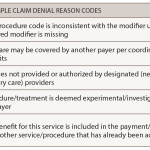Regardless of the approach you ultimately select, denial management is typically time and resource intensive to implement. If you make the commitment to implement a denials-management process using internal resources, be prepared to:
- Make decisions in advance and identify which payers you will target, how you will define your denial reasons, and what information system changes are needed.
- Prepare an implementation plan that details each of the activities needed to complete the timetables for each denial.
- Develop a plan to gather fee schedule information.
- Identify reports that will be used to monitor efforts and outcomes.
- Communicate the importance of the project to all clinical and nonclinical staff,
- Define the process and benchmark performance targets, timetables, and performance standards for employees charged with performing the daily charge entry, billing, follow-up, and reporting duties.
- Anticipate and budget the additional staffing and related expenses associated with the additional claims follow-up, management, and reporting duties.
There may be extensive opportunities for recovering lost revenue and analyzing performance in your practice. Creating a denials-management strategy will help you identify problem areas in your practice and create opportunities to eliminate them. Keep in mind that this is not a one-time process—consistent training and education is necessary to prevent unpaid claims.
For assistance with practice-management issues, contact Cindy Gutierrez, MBA, senior specialist of insurance and practice management at [email protected] or (404) 633-3777, ext. 310, or visit www.rheumatology.org/practice for additional resources on coding, billing, ICD-10, and health information technology.
Practice PEARLS
Prepare for ICD-10
The compliance date to transition from ICD-9-CM to ICD-10-CM is October 13, 2013. Although this date seems far away, there are specific activities that physicians should work on now for a smooth transition.
Create an ICD-10 team: This should include physicians, coders, and practice managers, depending on the size of the practice. The team should have specific responsibilities to assist the practice in preparation for ICD-10. Responsibilities include:
- Identify affected areas that currently deal with ICD-9 coding;
- Create an agenda for regular meetings and updates of ICD-10;
- Create a communication plan for the practice; and
- Establish an educational plan for key staff members.
For assistance on ICD-10 implementation, contact Antanya Chung, CPC, CPC-I, CRHC, director of practice management, at [email protected] or (404) 633-3777, ext. 818, or visit www.rheumatology.org/practice.
Join us for the ICD-10 Training Session—a State-of-the-Art postsymposium event—in Chicago on April 29. Visit www.rheumatology.org for more information and to register.


